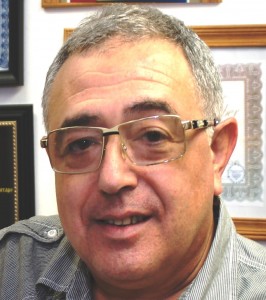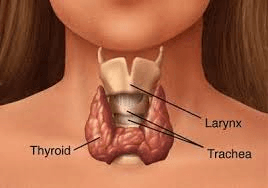What is thyroid and what causes problems in this gland?
A thyroid, a W-shaped gland located in the front part of the neck right below Adam’s apple, is one of the most important glands of the body, that regulates functionality of other glands. Another word thyroid gland is a major part of a complex mechanism, and all parts of the body are regulated by a thyroid hormone.
 Hypothyroidism is a condition that represents the low function of the thyroid gland. The number of cases of the hypothyroidism per 1000 of the population grows very fast and becomes and epidemic. Many individuals in our society are suffering for years with no symptoms of the disease. This disorder can and in many cases is so slow developing that the only sign of the disease is moderate weight gaining. However, there are so many reasons for gaining weight in today’s life that nobody even thinks about hypothyroidism in the first place.
Hypothyroidism is a condition that represents the low function of the thyroid gland. The number of cases of the hypothyroidism per 1000 of the population grows very fast and becomes and epidemic. Many individuals in our society are suffering for years with no symptoms of the disease. This disorder can and in many cases is so slow developing that the only sign of the disease is moderate weight gaining. However, there are so many reasons for gaining weight in today’s life that nobody even thinks about hypothyroidism in the first place.
People are trying to lose weight, spend more time in gyms, walking and jogging, but… The weight does not change. This is the first call. Also, the gain of weight in the case of hypothyroidism has some specific properties. The person that suffers from this endocrinological disorder looks puffier that fatty.
Also, in many cases, this disorder starts not from the thyroid gland as expected, but from the immune system that creates antibodies that keep the function of the gland very low. This condition is known in medicine as Hashimoto disease in honor of the Japanese medical doctor who first described it.
The biggest problem, however, is that in many cases specific blood tests for TSH, TSH-3, and TSH-4 do not help in diagnostic and show normal results.
Hypothyroidism is a medical condition when the level of thyroid stimulating hormone (TSH) goes up and the levels of the T4 and T3 drops. reported.

Nevertheless, in my medical practice, I recurrently observe patients who demonstrate a decrease of T3 without any abnormality in T4 level and at the same time having low or normal TSH. This uncommon form of disorders in the gland has been described in scientific publications for a long time however it wasn’t often accepted or deliberated in traditional medical symposiums. A majority of physicians (including endocrinologists) have insufficient or very limited knowledge of internal physiological dysfunctions that cause those conditions as well as how to fix them.
I often question my patients, who have these or similar results of lab work what their primary physician said and how he/she explained it. Usually, I don’t hear any answer from them or something like “not much”.
Based on today’s scientific findings in endocrinology regarding this gland’s dysfunctions, there are three different names of the disorder that manifest low level of T3:
- Euthyroid Sick Syndrome (ESS);
- Non-thyroidal Illness Syndrome (NTIS);
- Low T3 Syndrome.
And there is one very important thing that should be explained…These conditions have nothing to do with the thyroid gland and the biggest mistake that can be made is to prescribe to this kind of patients – Synthroid.
So, what is the trick in thyroid’s physiology and what causes this T3 deficit?
There are 5 steps in the mechanism that controls thyroid’s functionality:
- The hypothalamus (a small gland situated inside a brain) controls the concentrations of thyroid hormones in the blood stream and creates thyrotropin-releasing hormone (TRH). This Thyrotropin Releasing Hormone (TRH) forces thyroid to fabricate more T3 and T4.
- TRH immediately stimulates a pituitary gland that synthesizes Thyrotropin, also known as Thyroid Stimulating Hormone or TSH.
- This Thyroid Stimulating Hormone kicks of production of the T3 (Triiodothyronine) and T4 (Thyroxine) by the thyroid gland.
- Deiodinase in different tissues of the body convert T4 into T3 and then D3 deactivates Triiodothyronine (T3) in the liver.
- After that Thyroxine and Triiodothyronine become free T4 and free T3 and at this point, they are capable of exercising their metabolic outcome.
Hypothyroidism normally caused by a dysfunction step 3, when the thyroid supposed to produce its hormones. This condition is well known in western medicine as Hashimoto’s, Ord’s, Graves’ diseases. Also, an iodine deficiency is another disorder that starts in step 3.
But the problem is that the Low T3 Syndrome or Non-thyroidal Illness Syndrome (NTIS) initiates in steps 1, 2, 4, and 5, which has nothing to do with thyroid gland itself.
Below is a documentary video prepared by a well known holistic practitioner David Brownstein, who dedicated a big part of his medical career to this subject.
How to treat Thyroid disorders?
Alternative and Holistic Medicine have an answer to thyroid disorders. First of all using the alternative diagnostic techniques like Iridology, pulse diagnostic, and tongue diagnostic holistic practitioners can diagnose this condition even if the blood work shows normal TSH.
After the problem is diagnosed use of acupuncture, Reiki, and homeopathy can bring much better result than Synthroid and other drugs.
When I see patients with thyroid problems my first choice of treatment is homeopathy. The philosophy of this German medicine allows to pinpoint straight into the roots of the problem, find the appropriate constitutional remedy and cure the patient. The good thing about homeopathy that if the correct remedy chosen and prescribed it will more likely cure the patient completely.
Even so, that homeopathy is very effective for patients with thyroid problems I would combine it with Reiki. From Reiki point of view any thyroid disease related to the condition of the throat chakra and in most cases this chakra is closed. The opening of the chakra would bring very fast initial positive change in patient’s condition.
Sometimes I combine or Reiki and Acupuncture. The thing is that these both methods have the same philosophy. In the case of acupuncture the practitioner moves energy in the patient’s body using needles and in Reiki practitioner reaches the same goal using the power of hands.
At Viva Healthy Life Medical Center full spectrum of holistic treatments used in case of Thyroid disorders. Treatment performed by Dr. Tsan at this facility is very fundamental and effective.
You must be logged in to post a comment.